
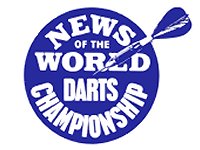

|
 |
|
| Brief
Beginnings and History The game, or sport, of darts has been around, in various forms, for hundreds of years. Darts were historically used in warfare in ancient times, similar to miniature spears, where they were thrown at the enemy and it was the practice of this that developed certain skills. Although no specific details exist, popular belief on the origin of the game dates back to the reign of King Henry VIII of England as it is believed that he ordered his archers to practice their skills all year round so that they would be ready for battle at any time. The archers developed an 'indoor' version of this as a kind of game using cut down arrows, or crossbow bolts, to throw at targets. Apparently Henry VIII was quite impressed with this new game and reports from 1532 state that he was given a set of richly ornamented 'darts' as a New Year gift by his future wife-to-be, Anne Boleyn, to gain his favour. Some unconfirmed accounts suggest that the game was originally taken to America in 1620 aboard The Mayflower by the Pilgrims who played the game to pass the time during their voyage. The first purpose-made darts were made from a single piece of wood, with turkey feathers for flights and strips of lead wrapped around the barrels for grip and weight. Curiously, these were mainly imported from France and hence became known as 'French darts'. It is generally accepted that the game of darts is of English origin and has been the subject of amusement and competition in pubs, clubs and taverns throughout the UK for the past 120 years or so. The 'Modern' Game Metal barrels made from brass, which was fairly cheap and easy to work with, were patented in 1906 but wood continued to be used even into the 1950s. The metal barrels were drilled, or tapped, and wooden shafts inserted into them using fletched or paper flights. These were most common before the 1970s when plastics started to be used for shafts and flights and barrels started to be made from heavier alloys such as nickel-silver or tungsten, providing an improved size/weight ratio. I bought my first set of copper-tungsten darts c.1973 at a cost of £18 - about a week's wages then! From the 1980s nickel-tungsten, some with an increase in tungsten content to as high as 97%, has become the most popular medium for barrels. Dartboards were originally made from wood until Edward Leggatt made the first Nodor dartboard from modelling clay in 1923, but it was not popular as it did not make the traditional sound when the dart hit the board. The company name came from the odourless clay used - 'No Odour' being shortened to 'Nodor'. By 1924 Leggatt had added elm dartboards to Nodor's production which saw further innovation when brass elements were added in 1928. In 1931 Frank Dabbs had a novel idea for dartboard construction that consisted of a vertically laced rope coiled and bound to form a circular target. Bristle dartboards were patented by Nodor in 1932 and introduced in 1934. The first Nodor Original Bristle Dartboard was manufactured in 1935 and, at about the same time, the 'clock' pattern as used today was adopted as the standard for all dartboards. The Nodor company was later to produce 'Supabull', in 1984, with the first staple-free bulls eye.
In 1945, Harry Kicks began to manufacture paper-coil dartboards named 'Keep Dry' as they did not require soaking like the traditional elm boards. In later years the Kicks family business also began to make bristle dartboards under the brand name H.A. Kicks and Sons. In the mid-1970s the company changed its name to Winmau. The legality of darts, as to whether it was an illegal game of chance or a legal test of skill, was challenged in 1908 in a Leeds court when publican Jim Garside was prosecuted for allowing the game to be played on his premises, the Adelphi Inn. He took darts player William 'Big Foot' with him to the hearing, who demonstrated his proficiency at the game and convinced the magistrates to award their decision in favour of 'skill'. Even so, not everyone was always allowed, by law, to play darts. In the 1930s the game was banned in Huddersfield on health grounds, in Liverpool where it was alleged that it encouraged drunkenness and in Glasgow, where local magistrates purported that it could encourage young people to use pubs. Despite questions being raised as high as Parliament, these bans were not removed until after the Second World War. At the outbreak of WW II virtually all sports were either cancelled or suspended and this included the News of the World individual competition. During this period the newspaper managed to maintain the profile of the game by creating a 'team of champions', which included famous players such as John Ross and Jim Pike, who played matches against all-comers to raise funds for the Red Cross. The game helped to boost morale in the armed forces during WW II, being played by troops anywhere from the officer's mess to some prisoner of war camps, and was so popular that, by the middle of the war, sets of darts had become standard issue to all services. No doubt the American troops stationed in Britain also became involved and took darts back home with them to regenerate post-war interest in the game that, by then, was hardly known in the USA. The end of WWII heralded the reintroduction of The People National Team Championship, first competed for in 1938/39, and The News of the World Darts Championship which originally began in 1927. The National Darts Association (NDA), formed in 1925 to try and standardise the game across the country, did not survive the war but its 'rules' remained in place, used by these two major competitions and the many brewery and pub leagues which were spreading across the UK. Despite a number of attempts to introduce another national controlling organisation, nothing really happened until September 1954 when 'The People' newspaper and some London-based organisers supported the setting up of the National Darts Association of Great Britain (NDAGB). During the 1950s and 1960s the NDAGB controlled the game, working on establishing hierarchical county organisations and attracting sponsorship from companies such as Guinness for a national pairs competition and the Nodor dartboard company for a national four-player tournament. Despite this, during the period of NDAGB control, darts continued to be a comparatively low-profile game holding little significance in terms of media coverage, with the exception of The People and News of the World competitions. |
 Wooden Dart 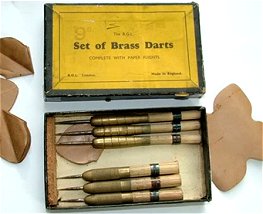 Brass Darts and Paper Flights 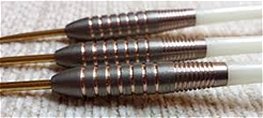 Copper Tungsten Dart 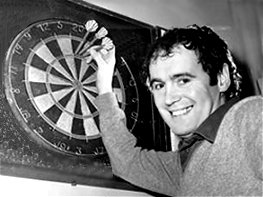 Sid Waddell |
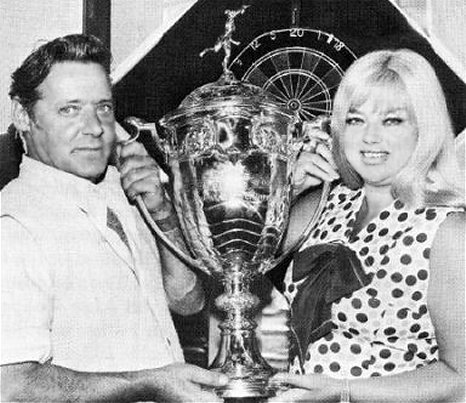 Peter Chapman and Diana Dors with the trophy in 1974 |
Surprisingly, darts
had actually first appeared on television on Saturday 29th May 1937 at 9.25
p.m. when the BBC London service broadcast a programme from Alexandra Palace
called 'Darts and Shove Ha'penny', featuring a competition between two local
teams. Other matches were also broadcast by the BBC during the late 1930s
but the game was largely ignored after the war until, in 1962, the Westward
TV Invitational Darts Championship was broadcast to local viewers in the
south-west of England. In April 1972 ITV first broadcast the News of the
World Individual Darts Championship from the Alexandra Palace and, in 1973,
Yorkshire Television produced a television series called 'The Indoor League',
which was introduced by Fred Trueman and included 'traditional pub games'
such as shove ha'penny, arm wrestling and darts. One of the producers of this series was a certain Sid Waddell, working with another chap called Dave Lanning. Recognising this lack of ambition, the British Darts Organisation (BDO) was formed in 1973, led by Managing Director Olly Croft, and the NDAGB gradually went into decline as the BDO found sponsors, introduced formal inter-county competitions and started to attract the television and media coverage that was to turn darts into an international, professional game. New technology such as the 'split screen' on TV really pushed the viewing popularity of the sport forward, leading to the rise of the first 'superstars' of the sport who included names such as Eric Bristow, John Lowe, Alan Evans, Jocky Wilson, Alan Glazier and Leighton Rees. The News of the World Individual Championship After World War I, pubs and breweries began arranging their own local darts leagues and there was a natural progression towards a requirement for competitions that encompassed wider areas. At that time, different areas and regions used different boards and throwing distances until it started to be more regulated by the newly-created National Darts Association in 1927. The NoW competition was notable for doggedly retaining its arguably more difficult 8ft throwing distance rather than the more widely recognised 'standard' of 7ft 9¼ inches set in 1977. In 1927 'The championship every dart player wants to win' was inaugurated and it was to become England's first national darts competition from 1947 until it was discontinued in 1990. Despite a brief revival of the competition in 1996/97 it remains discontinued, being overtaken by professional competitions and other televised events. The first tournament, held in the 1927/28 season, was jointly sponsored by The News of The World newspaper and the C.N Kidd & Sons brewery in Dartford. It was originally limited to the metropolitan area of London and attracted around 1,000 entries, eventually being won by William Jewiss. The popularity of the competition rapidly expanded and, by 1938/39, there were six different regional events: London and South England, Wales, Lancashire and Cheshire, Yorkshire, the North of England and the Midlands. The total number of entrants in the competition that year was more than 280,000. In the London and South England event a crowd of 14,534 spectators was attracted to the Royal Agricultural Hall, London to watch the final played between Jim Pike (The Windmill Club, Southwark) and Marmaduke Brecon (Jolly Sailor, Hanworth, Middlesex) which Brecon won by two games to one. Despite the regional events, there was no national championship until 1947/48, when it was resumed after World War II. ITV televised the final stages from 1970 and it became the first nationally televised darts event, being broadcast by ITV from April 1972 onwards (except for 1986 due to a technician's strike). The News of the World Championship ended in 1990, which was also the first year that men and women competed in separate competitions were held for men and women. The competition made a one-time only reappearance in 1996/97 in a deal between Sky Sports and the News of the World, but the overall response was disappointing and the News of the World decided against running it again. The winner in that year was Phil 'The Power' Taylor, beating Ian White 2-0. His prize was £42,000 and a set of Unicorn golden darts but far more important to him was the fact that he had won the competition which, as he wrote in his autobiography, his mentor Eric Bristow always mocked him for never having won. |
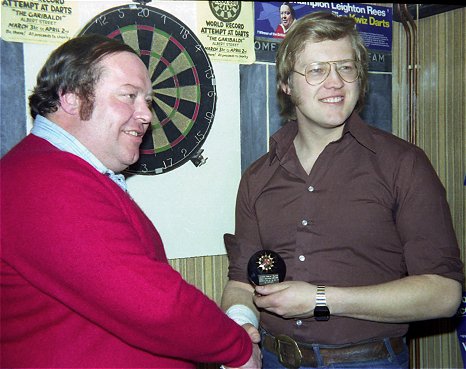 Above is 1975-1976 losing finalist Leighton Rees (who sadly died in 2003) pictured in 1978 after he had won the first World Professional Darts Championship, beating John Lowe 11-7. Who is that chap with him? That's me, receiving a trophy for becoming the world record holder (in a team of 8) for 1,000,001. Just for interest........ Guinness Book of Records World Champions March 31st - April 3rd 1978 at The Garibaldi public house, Albert Street, St.Albans, Herts 43,599 darts, beating the old world record by 9,285 darts. 55.75 hours, 14,533 shots, 41 miles walked. Clint Hough (me) 331,450 @ 25.28 average / dart over 53 hours, which included 30 x 180, 273 x 140-177, 87 x 120-139 and 920 x 100-119 Martin Riley 281,172 @ 23.55 average / dart (31 x 180) Paul Murphy 98,432 @ 21.06 average / dart Mick Dyer 87,871 @ 20.67 average / dart Danny Weadick 82,775 @ 20.53 average / dart John Welch 81,667 @ 21.88 average / dart Ken Smit 29,160 @ 20.33 average / dart Brian Wilmott 7,474 @ 17.54 average / dart Also Alan Rowe, who operated the adding machine perfectly for the entire event. |
|
 |
|
|
Bit past it now, but if you want to see more about my darts 'career', including photos, cuttings and programmes, click on the board. |
|
|
All
Original Material Copyright SixtiesCity
Other individual owner copyrights may apply to Photographic Images |